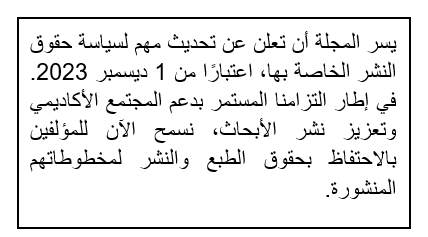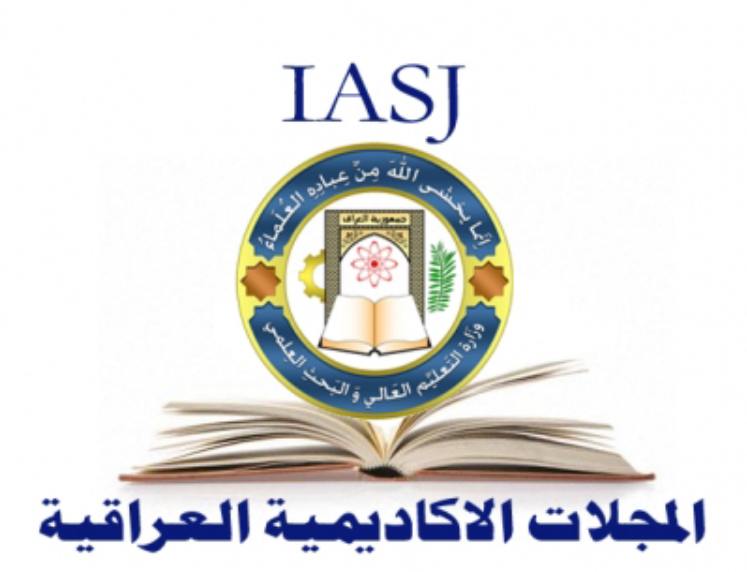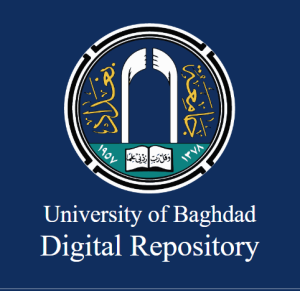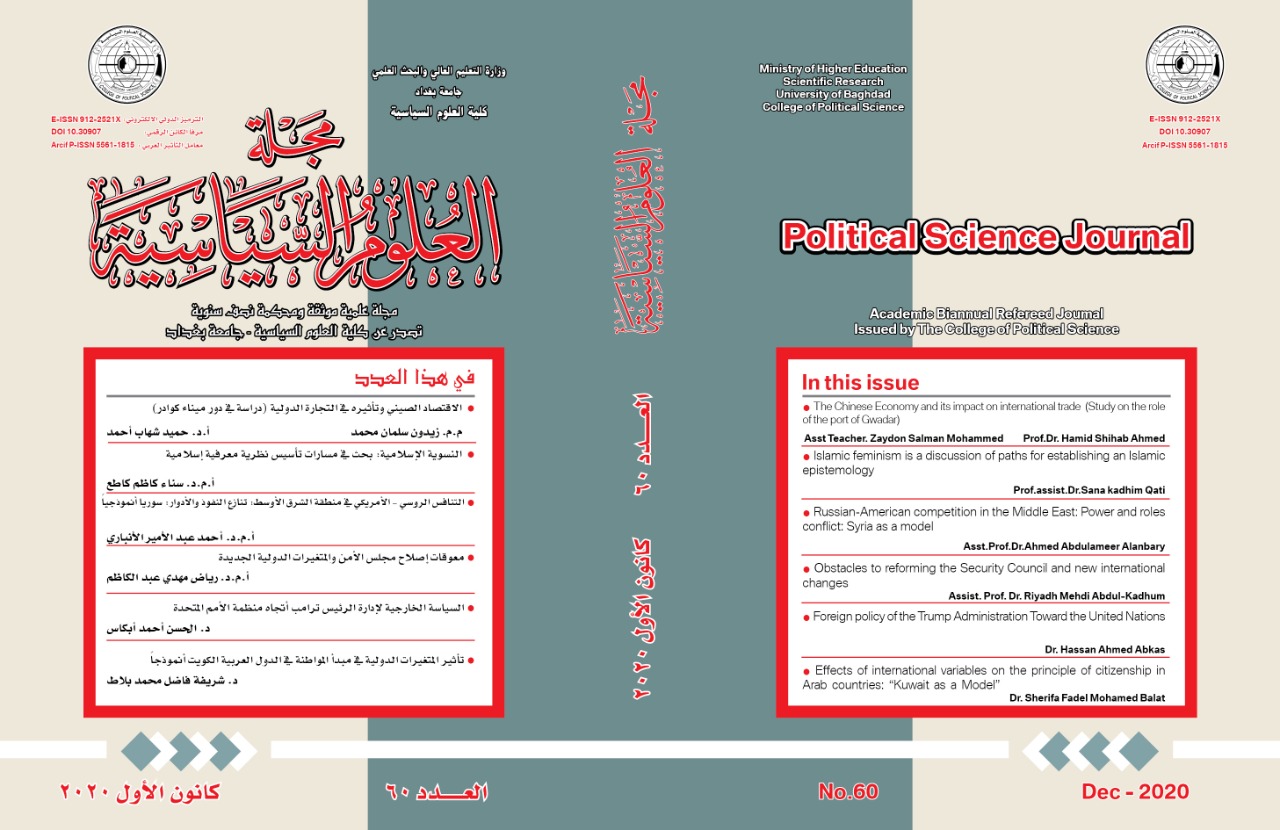The Requirement of the National Democratic project in Iraq post Daesh Terrorist Group Stage
DOI:
https://doi.org/10.30907/jj.v0i59.458الكلمات المفتاحية:
Requirements; Democratic Project; Daesh;Iraqالملخص
This study aims at re-transmit the spirit of the national democratic project of Iraq post of the chaos left by the Daesh terrorist group stage(The Islamic State of Iraq and Syria, ISIS) , Which controlled large parts of Iraq, and had an adverse effect on the political scene in Iraq, inspired everyone that there are deficiencies in the political, economic, religious and ethnic structure of the Iraqi people in non-response to democratic thought.The researcher relied on the hypothesis that " the requirements of building a democratic project are based on the need to provide the requirements ranging from two interrelated aspects, like the institutional aspect and the aspect that related to the general and necessary requirements for the establishment of democracy in society, in which the principles of majority rule, the rule of law, authority concentration on the principles of the people's rule , and the rights of individuals guaranteed". This study utilized systematic analysis approach, historical approach,and the inductive approach undertaking the research. Government reports, statutes and laws were likewise hotspots for essential information in this review. Optional information was fundamentally from scholastic works, for example, books, diary articles, and theses. The results revealed that the model of building democratic Iraqi society post-ISIS needs primarily the government integrated system that includes principles, institutions and mechanisms that control the process of identifying options, making public decisions and the circulation of power periodically, In addition to balancing between rights and duties which can considered as the one of the main characteristic of democracy in order to achieve and developing security and stability in Iraq .
المراجع
See also : Thanaa Fouad Abdullah: Mechanisms of democratic change in the Arab world, 1st ed., Beirut, Arab Unity Studies Center, 1997, p. 29.
ii. Hussein Jamil: Human Rights in the Arab World, Series of National Culture (1), 2nd ed. , Beirut, Center for Arab Unity Studies, 2001, p 79.
iii. Musa al-Budairi: Democracy and the experience of national liberation, The Palestinian situation in: Burhan Ghalyoun and et al., On the democratic option, Review Study, 1st ed., Beirut, Center for Arab Unity Studies, 1994, p. 198.
iv. Jean Leica: Moving Towards Democracy in the Arab World: In book : Democracy Without Democrats : Openness Policies in the Arab-Islamic World, Researches on the Intellectual Symposium organized by the Italian Institute (Fonda Cionas Eni Africo Matte) in cooperation with the Center for Arab Unity Studies , 2nd ed. , Beirut, 2000, p. 48.
v. Thamer Kamel Mohammed: Third World, Third World and the Challenges of the Post-Cold War, al-Hikma Magazine, No. 20, Fourth Year, 2001, p. 63.
vi. Abdul Ilah Balqziz: Democratic Transition in the Arab World, Obstacles and Possibilities, Journal of the Arab Future, No. 219, 1997, p.28
vii. Saad Eddin Ibrahim and et al: Political Pluralism and Democracy in the Arab World, 2nd ed. , Amman, Arab Thought Forum, 1989, p.15
viii. Hussein Alwan: Political Participation in Developing Countries, The Magazine of Arab Future, No. 222, 1997, pp. 69-70.
ix. Harold Laski: Freedom in Modern States, translated by Radwan Ezzeddine, 1st ed., Cairo, Dar al-Kitab al-Arabi, 1997, p. 66.
x. Munther Anabtawi: Human as a case and rights, in Defense of Human Rights in the Arab World, Tunisia, The Arab Institute for Human Rights, 1991, p. 133.
xi. Nariman Amer and et al., Factors of Civil Peace and Civil Conflict in Syria, Center of Civil Society and Democracy in Syria, 2013, pp. 8-11.
xii. Hassan Mohamed Shafiq: Comparative Political and Constitutional Systems, University of Baghdad, 1986, p. 282.
xiii. Iman Mohamed Hassan, The Functions of Political Parties in Restricted pluralistic Systems, al-Ahali Book No. 54, Cairo, October 1995.
xiv. Thamer Kamel Mohamed, Modern Political Systems and Public Policies, Dar Majdalawi, Jordan, 1st ed. , 2004, p. 213.
xv. It should be noted that the Prime Minister, Dr. Haider al-Abadi, had announced the first reform package on 9th Aug. 2015, later Mr. Moqtada al-Sadr proposed a reform project on 13th Feb. 2016. , then Mr. Ammar al-Hakim presented a reform initiative on 4th Apr. 2016 , and Sheikh Qais al-Khazali presented his reform initiative on 8th Apr. 2016.
xvi. Abdul-Jabbar Ahmed, Federalism and Decentralization in Iraq, Friedrich Ebert Foundation, Baghdad-Amman, 2013, p.9
xvii. Habib Balkoush, Transitional Justice and Democratic Transition in the Arab Context, Arab Politics, 18 January 2016, p. 79.
xviii. Liz Sly, “How Saddam Hussein's former military officers and spies are controlling ISIS”, Independent, (Sunday 5 April 2015),
xix. Thomas A. Paley: Combating the Curse of Natural Resources: Funds to Distribute Revenue to Citizens (Iraq Oil Problem Model), Beirut-Baghdad, Institute of Strategic Studies, 2008, pp. 6-7.
xx. Gordon Johnson and Majeed al-Hiti , The Curse of Oil …The Political Economy of Domineering, (Beirut-Baghdad, Institute for Strategic Studies, 2008) p.13.
xxi. Faleh Abdul Jabbar, The building or disintegration of Iraq within the framework of the theories of nationalities and nations, Aseminar of the Union of Authors and Writers in Iraq, Baghdad, Wednesday 8/11/2017.






 ©️ 2023 The Author(s). Published by College of Political Science, University of Baghdad. This is an Open Access article distributed under the terms of the
©️ 2023 The Author(s). Published by College of Political Science, University of Baghdad. This is an Open Access article distributed under the terms of the 












